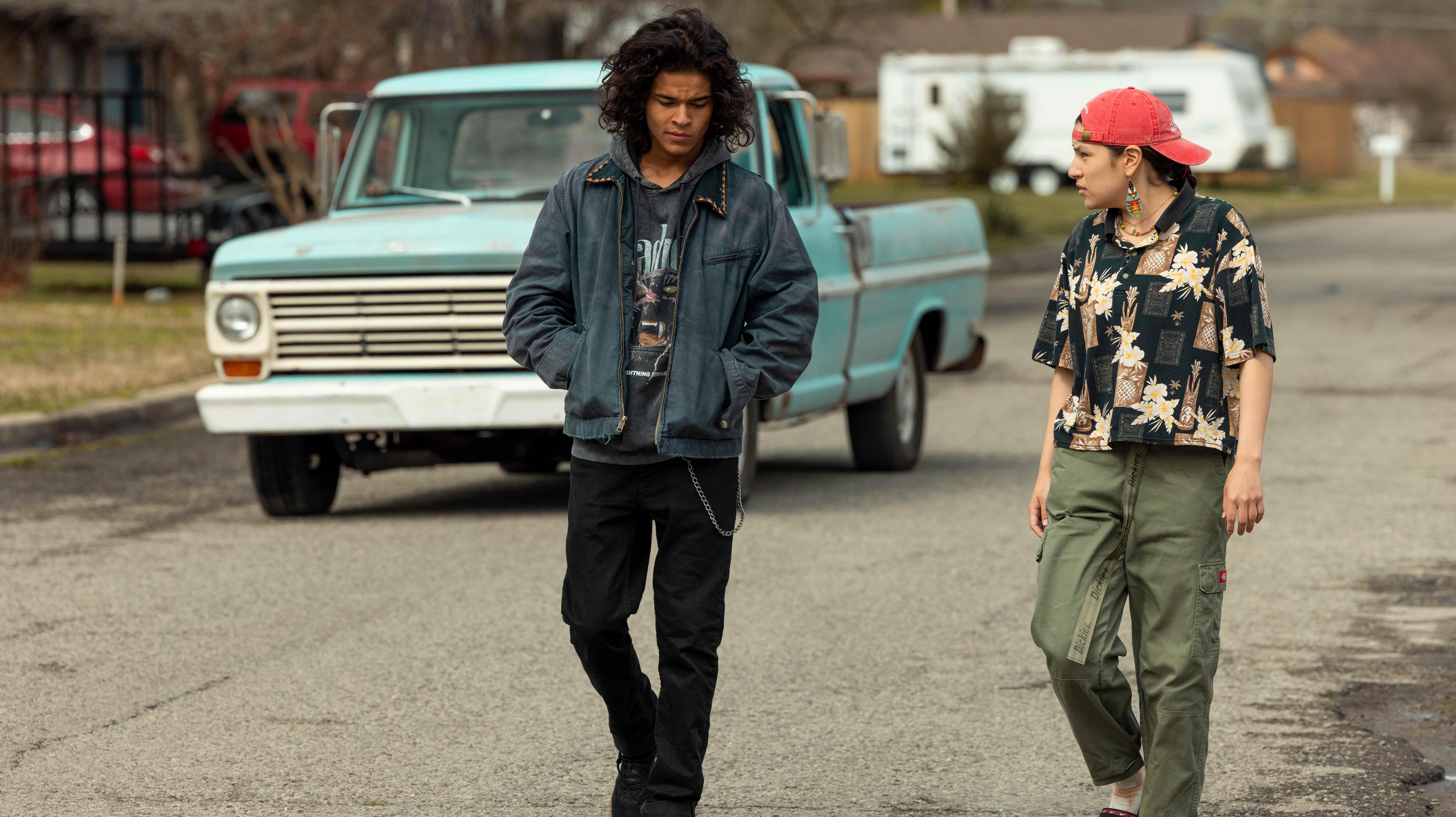Reservation Dogs returns with a sublime season 2
The FX show deftly mixes dark subjects, winsome humor, and a grounded-yet-stylized vision

To say Reservation Dogs is unlike anything on television is, perhaps, to sell it short—mostly because, both in its tenor and subject matter, the comedy deserves to be understood in its own terms. Luckily, as its second season makes clear, Sterlin Harjo and Taika Waititi’s award-winning FX show continues to blaze a path for itself.
This season finds the series’ central quartet picking up the pieces of their lives following the tornado that wrecked their reservation when last we saw them. We start not with the tight-knit group that the show’s title suggests, but with the friends scattered: Bear (D’Pharaoh Woon-A-Tai) is still reeling from what he sees as a betrayal by Elora (Devery Jacobs). The young wide-eyed teen left her pals behind and opted to head to California with only Jackie (Elva Guerra) in tow, a move that has left Willie (Paulina Alexis) wondering whether the curse she’d put on that prickly new arrival to the reservation has somehow backfired. And Cheese (Lane Factor), as ever, is along for the ride, finding quiet moments to offer some respite with memorable, deadpan one-liners.
The genius of Reservation Dogs comes from the way it takes very dark material (generational trauma, wounding grief, systemic inequities) and turns it into winsome humor—but not as away to make those issues feel more palatable. This isn’t a show that preaches, both within its fiction or to its audience, that laughter is a way to get through life’s hardest moments or undo centuries-old stereotypes. Instead, by weaving in absurdist set pieces like Dallas Goldtooth’s chatty spirit guide William Knifeman (who has a maybe-fake story for every situation Bear finds himself in) or Lil Mike and Funny Bone’s rapping duo Mose and Mekko (now with less bikes!), the show reminds us that there is always joy to be found in upending expectations and weaponizing oft-repeated punchlines.
That extends beyond its ensemble cast, too. In brief scenes that sketch out possibly helpful (or perhaps insidiously self-serving) white folks (Josh Fadem and Megan Mullally as, respectively, a driver all too eager to give Elora and Jackie a ride and a divorcée who opens her home to the runaway teens), the show leaves audiences wondering how much of their own prejudices are at play when encountering such stock characters in a show that doesn’t center their worldviews.
Here is a comedy (drama? Dramedy? Static labels truly don’t apply) about how hard it can feel to make a life for yourself when such a possibility seems futile at best and impossible at worst. Daniel’s death continues to cast a pall over his friends, who still wrestle with what they could have done to better support the struggling teen. But it’s also energized them to reassess their lives and pave paths ahead that, even if they can’t wholly break cycles of trauma, can at least inch them toward a more generative vision of their world. Season two finds our central quartet struggling with how to move forward with the pain and loss they carry with them. And rather than offer pat platitudes about how to do that, it tackles the darkness head on.
Reservation Dogs is not only a much-needed corrective of decades of Native American representation (or erasure) on U.S. television, but it also accomplishes another feat: churning comedy gold out of a grounded if stylized vision of reservation life.
Moreover, in a prestige television landscape that can sometimes feel actively hostile toward episodic TV (dear god let us not hear any more “it’s a 10-hour movie” pronouncements!), Reservation Dogs really takes advantage of its half-hour units. Whether solely following Bear on his first day as a roofer (which doubles as a bottle episode about what a healing kind of modern Native masculinity can look like), or capturing the intergenerational community-building that can happen when faced with a devastating loss (a tender episode on grief that features a pitch-perfect Star Wars throwaway quip), this is a series that keenly captures a slice of life of a community that’s had to make do with crumbs for way too long.